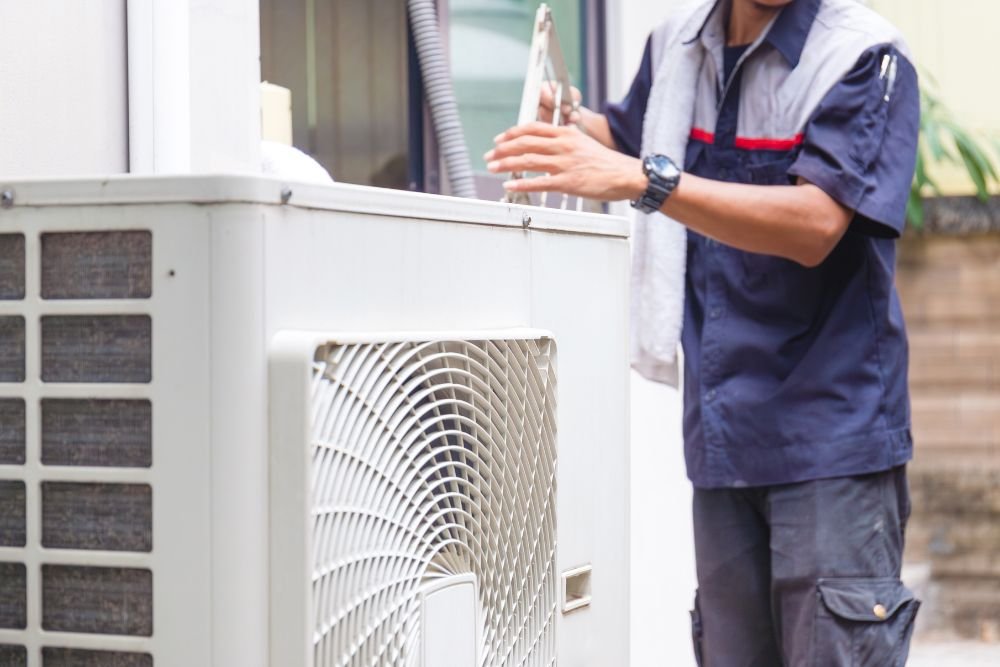Is Your AC A Dying Gasp?

Sweltering summers and icy winters are no match for your trusty air conditioner... until it isn't. Before you brace yourself for another stifling summer, pay attention to these five signs that your AC might be on its last legs.
- Constant breakdowns: If you're investing more and more in fixes, it might be time to replace your outdated AC.
- Decreased efficiency: Is your AC struggling to keep up? A dwindling cooloutput|a constantly running unit without proper results could indicate a failing system.
- Unsettling rumbles: Grinding, screeching, or clanging coming from your AC unit aren't normal. These ominous sounds often signal worn-out parts
- Increased electricity consumption: A failing AC works harder and uses more energy, resulting in higher bills. If your energy costs have increased dramatically, it's worth investigating.
- Age: Even with regular maintenance, air conditioners have a limited lifespan. If yours is over 20 years old, it's highly likely that replacement is on the horizon.
Ignoring these signs could lead to a complete system failure during those critical summer or winter months. Replacing your AC before it completely quits can save you time, money, and anxiety in the long run.
HVAC Woes: When Repairs Mean Replacing Your Whole System Swapping Out
Dealing with a persistently problematic HVAC system can be frustrating and costly. While minor repairs might seem like the most sensible solution initially, there are instances where investing in a complete replacement becomes more beneficial than continually patching up an aging unit.
- If your system is ancient and constantly requiring frequent repairs, it's a clear clue that its endurance is nearing its end.
- When the cost of troubleshooting consistently exceeds a significant amount of a new system's price, it's time to reconsider your options.
- Technological advancements in HVAC systems have led to significant improvements in energy efficiency and performance. A new system can noticeably lower your energy expenses.
Ultimately, the decision to replace your HVAC system is a complex one that involves considering factors such as age, repair history, cost of repairs versus replacement, and energy efficiency. Consulting with a qualified HVAC specialist can provide valuable insights and guidance to help you make an wise choice.
Are Blowing Hot Air? Warning Signs Your HVAC Needs an Upgrade
Feeling like your heating/cooling/HVAC system is working overtime but not really keeping up? Your home might be showing/displaying some subtle signs that it's time for a fresh/new/updated HVAC system. A noticeable increase in your energy bills could suggest an inefficient/overworked/tired system. If you're constantly adjusting/tweaking/ fiddling with the thermostat and still not finding comfort, it might be a sign that your HVAC needs some TLC. A strange/unusual/odd smell coming from your vents could also indicate a problem demanding attention.
- Listen for grinding/clunking/rattling noises from your HVAC unit.
- Repeated breakdowns or malfunctions can signal a tired system.
- If the air coming from your vents feels weak/dull/less effective, it could be a sign that your unit is struggling to circulate/distribute/push air effectively.
Don't ignore these indications. Addressing HVAC problems early can stop more serious and expensive/costly/pricey repairs down the road. A properly functioning HVAC system is essential for a comfortable and healthy/safe/well-maintained home environment.
Wasting Money Away! 6 Clues Your HVAC is Finished
Is your cooling system acting up? Don't ignore the clues that it's nearing its end. A broken HVAC unit can deplete you a fortune in maintenance. Here are 6 clear signs that your HVAC system needs urgent care:
- Your energy bills are increasing dramatically.
- Recurring breakdowns and issues.
- You're constantly adjusting the thermostat to find a comfortable temperature.
- Your home appears unevenly heated or cooled.
- Unusual noises coming from your HVAC unit.
- Your air conditioner is blowing warm air, even on the coldest setting.
When Your Cooling System Crashes : When to Call in the Experts
Dealing with a broken air conditioner can turn a comfortable home into a sweltering sauna. Froma simple refrigerant leak to fried compressor, there are a myriad of reasons why your AC might suddenly throw in the towel. While a DIY approach might seem tempting for minor issues, sometimes it's best to contact the experts.
- Consider these some signs that you need to consult a professional AC technician:
Whenever your AC unit sounds unusual,, it's time to takea step back. Strange sounds could indicate be indicative of a loose part to a serious malfunction..
- When your energy bills go through the roof, it's possible your AC is working overtime, wasting energy. A professional can pinpoint the source of the issue
{Remember,Always keep in mind,Keep this in mind: Ignoring a problematic AC unit can lead to bigger, more costly repairs down the line. By calling in the experts when Fort Lauderdale real estate team you notice warning signs, you can stay ahead of major headaches and ensure that your home stays cool and comfortable all summer long.
Age vs. Performance: Does Your HVAC Need a Change of Pace?
Your home's heating, ventilation, and air conditioning (HVAC) system is responsible for your comfort year-round. But, just like any complex machine, it naturally loses efficiency over time. As your HVAC ages, you might start noticing signs of trouble. These can include skyrocketing electricity expenses, inconsistent heating and cooling, constant maintenance needs, and even unpleasant smells coming from the vents. If you're experiencing any of these symptoms, it might be high time for replacing your aging HVAC system.
- Be on the lookout for these signs:
- Increased utility costs
- Inconsistent temperature control
- Frequent repairs
- Stale air coming from the vents
Remember, a properly operating HVAC system not only keeps you comfortable but also contributes to lower energy consumption. Upgrading your HVAC system can be a worthwhile investment that saves money in the long run.